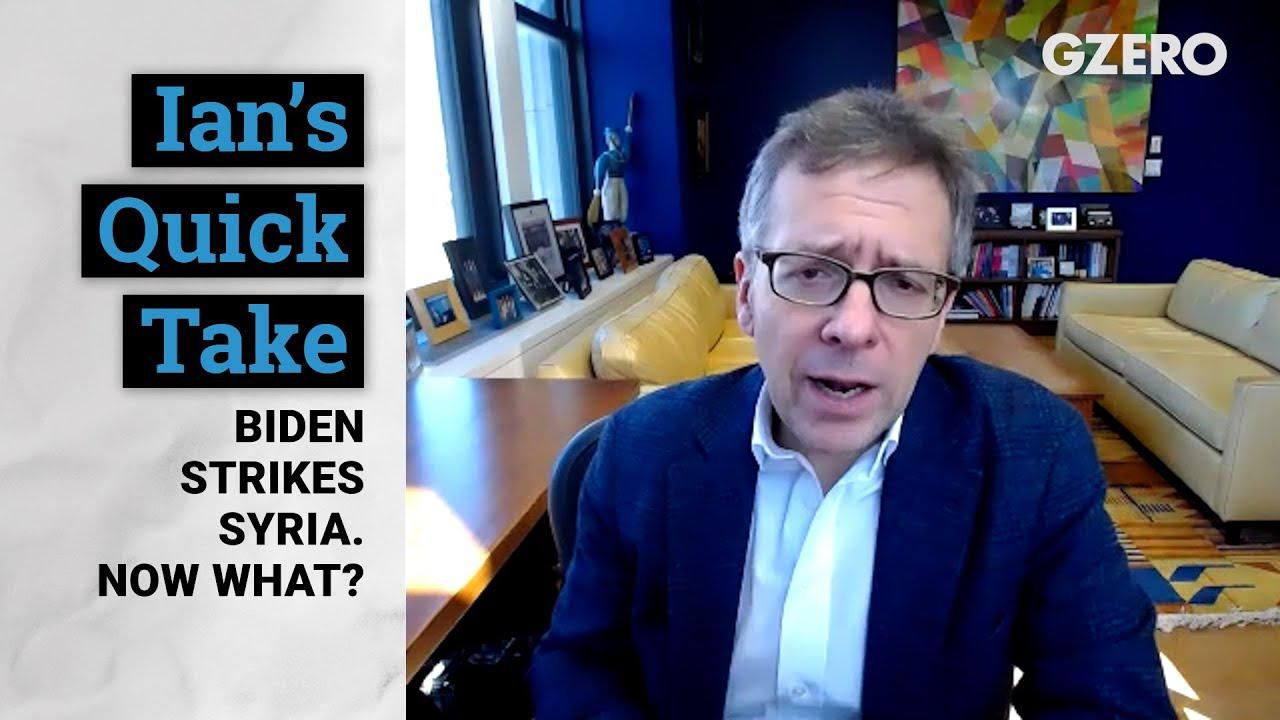
Ian Bremmer's Quick Take:
Hi, everybody. Ian Bremmer here, and as we head into the weekend, a Quick Take on, well, the first bombing campaign of the new Biden administration. You kind of knew it was going to happen. Against some Iranian-backed militias in Syria, looks like a couple of dozen, perhaps more killed, and some militia-connected military facilities destroyed. I think there are a few ways to look at this, maybe three different lenses.
The first is from the tactical perspective, it is a response to militias, also Iranian-backed, that had been used in attacks against American troops and American civilians, contractors in neighboring Iraq, and that had also led to casualties. The Iranians made an adversary of the United States in the Middle East, and the US does not want to give them a blank check in escalating against US presence in the region. You don't want to necessarily hit Iraq directly because then you undermine the government the US is trying to work with, and so instead, neighboring Syria, where those militias are an operation, easier thing to do. Pinpoint, fairly limited, seen as tit for tat, doesn't derail the efforts to open, reopen negotiations in the Iranian nuclear deal, the JCPOA, which are on track to proceed. And I have a fair amount of confidence that we will get back into that deal by the end of this year, beginning of next year. US will still be a major adversary of Iran. We will still have sanctions on Iran, but the Iranians will be able to start producing another million plus barrels a day of oil, and the inspectors will be able to constrain in a confirmable way Iran's lack of development towards nuclear weapons, at least for the near to medium term.
Okay, so that's the tactical piece. You check the box, kind of like you checked the box when Trump engaged in strikes in response for Assad's use of chemical weapons against civilians. Okay. But then take another step back and I want to tell you what the White House press Spokesperson Jen Psaki had to say, and I quote, "What is the legal authority for strikes? Assad is a brutal dictator, but Syria is a sovereign country." And of course, she's pointing out here that without congressional approval, a president engaging in strikes inside a sovereign country has no legal basis. It's a breach of the way law is supposed to work in the US. It undermines separation of powers. Now, what I didn't tell you is that Jen Psaki made that statement, not in the last 24 hours, but actually in 2017, but it doesn't matter. The same rules apply. I understand that consistency is the hobgoblin of little minds and now she's on the side that has the power as opposed to port when she's criticizing Trump, but again, it's the same point. Congress has abdicated its willingness to take responsibility. They won't engage in legislation. They won't raise the question to approve or disapprove the president's ability to continue to use war powers after 9/11. They say everything is a part of the war on terror, because if everything's a part of the war and terror, then of course nothing is and there are no constraints on executive use of military power. That's not the way it was supposed to work, and it undermines the legitimacy of US actions in the eyes of American citizens and more broadly.
And then to take the more macro and even existential question, what the hell are we doing in the Middle East? It is worth asking to what extent, in 2021, the United States should continue to have a large military presence on the ground as targets, not necessarily promoting stability, costing a lot of money, seen by many in the region is problematic, and in a part of the world that the United States increasingly doesn't consider strategic and doesn't care very much about. Now, I'm not suggesting that means the US should leave in toto, but I think at least worth asking the question. Because the world today doesn't look anything like the world of the oil blockade in the '70s and that great recession, doesn't look anything like the world after 9/11 and the war in Afghanistan, that continues, that persists, the longest war we've ever fought in our lifetimes. Why the persistence of the massive war machine in the United States, the US outspending the next seven countries combined in terms of defense spending? Does that make sense in today's world? Particularly as the us lags behind in R&D spending on new technologies compared to China, soon to be the largest economy in the world with a vastly smaller military capacity than the United States and not even trying to develop nuclear parity with the United States and Russia.
Now, US laws don't apply outside of our country, but humanity does, we're all people. And when I continue to hear the Biden administration and President Biden himself say, "The US is back," it's perhaps the most consistent thing I've heard in terms of foreign policy. "The US is back." We need ask ourselves, back to what? Do we want to be the world's policemen? Do we want to be seen as the indispensable nation globally? Do we still perceive ourselves as the exceptionalist power? Because most other countries around the world don't. I would say not exactly, and I agree that we want to live in peace, but I also think that by we, we don't just mean Americans.
Anyway, something to think about, see you all next week, have a great weekend, be safe, avoid people.